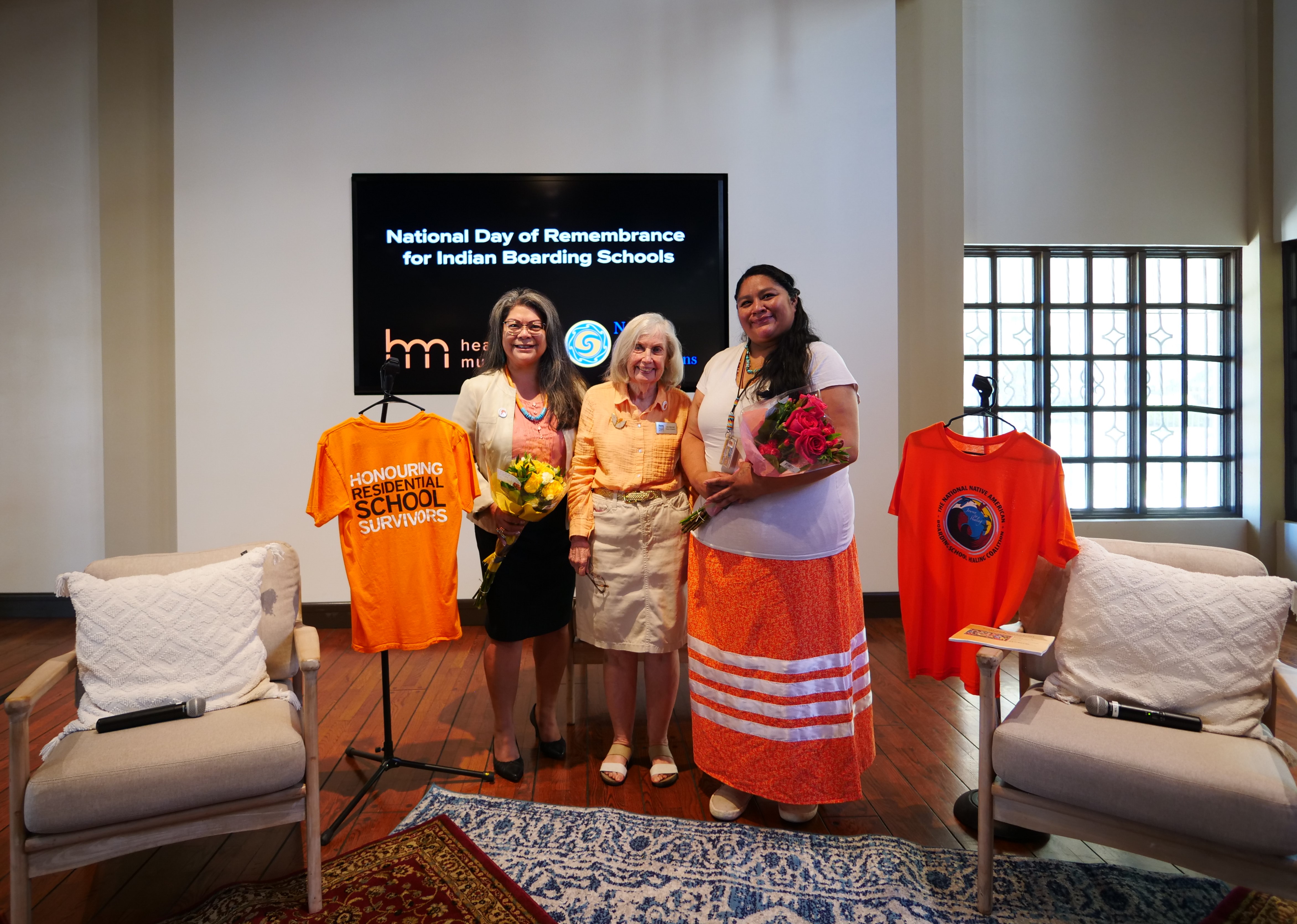featured_seasonal_and_giftsYour Monthly Gift, Their Endless Possibilities. Join our Monthly Giving Circle and make your impact today!

Thank you to everyone who joined us at the Heard Museum in recognition of National Day of Remembrance for Indian Boarding Schools known as Orange Shirt Day. On this day, we honor and remember the Indigenous children taken from their families and placed in boarding schools.
We are deeply grateful to the program speakers, Elena Selestewa (Hopi), Visitor Center Specialist at the Phoenix Indian School Visitor Center, and Patty Talahongva (Hopi), boarding school survivor and Chief Programming and Engagement Officer at the Heard Museum. Thank you for sharing your personal histories and helping us reflect on the lasting impacts of the American Indian Boarding School system.
Throughout the program, attendees engaged in journaling and reflection, responding to prompts like:
We encourage all to reflect on these questions, learn about the boarding school experience, and commit to reconciliation, recognizing the harm done and the support needed to bring healing to survivors, families, and all Indigenous Tribes & Peoples.
Special thanks to The Heard Museum for hosting this important event and for continuing to provide space for truth-telling, healing, and Indigenous voices.
Orange Shirt Day, observed on September 30, honors the Indigenous children taken from their families and placed in residential and boarding schools. The day began with the story of Phyllis (Jack) Webstad, whose new orange shirt—gifted by her grandmother—was taken from her on her first day at St. Joseph’s Mission Residential School in British Columbia. Her experience reflects the broader history of Indigenous children across Turtle Island who were stripped of their identities, languages, and cultures. The orange shirt has become a powerful symbol that Every Child Matters—and a call to remember these histories, honor the resilience of survivors, and commit to truth-telling and reconciliation.
Reflect on the American Indian Boarding School experience with guest speakers Elena Selestewa (Hopi), Visitors Center Specialist at the Phoenix Indian School Visitors Center, and boarding school survivor Patty Talahongva (Hopi), Chief Programming and Engagement Officer at the Heard Museum — who will share their personal histories and connections to Boarding Schools.
While you’re here, catch a special film screening of REMAINING NATIVE (2025), following the journey of 17-year-old Native American runner Kutoven “Ku” Stevens as he pursues his athletic dreams while confronting his family’s boarding school history.
This program is presented in recognition of the Day of Remembrance for U.S. Indian Boarding Schools, also known as Orange Shirt Day—a time to honor and remember the children taken from their families and placed in residential schools. Guests are encouraged to wear orange as a visible act of solidarity and to help raise awareness.
The Phoenix Indian Industrial School, known as the Phoenix Indian School in later years, was established in 1891, operating as a boarding school for American Indian children by the Bureau of Indian Affairs. Initially focused on forced assimilation of Native American children into mainstream American culture, it later transitioned into a traditional high school, and its history is marked by both trauma and resilience. The school served as a site of cultural suppression and, later, a place where students began to reclaim their heritage. Located at the corner of Central Avenue and Indian School Road, much of this site was transferred to the City of Phoenix from the Bureau of Indian Affairs in 1990, which the city used to create Steele Indian School Park. Since its closing, Phoenix has saved three historic buildings and placed them on the National Register of Historic Places. One of those historic buildings, the former grammar school building, is the same building Native American Connections and Phoenix Indian Center has renovated and transformed into the Phoenix Indian School Visitor Center — which offers a historic gallery, individual and group tours, educational programming, and conference and event spaces to the community.
Our traditions are the foundation of our organization - explore, learn, and utilize resources available for all.

Get the support you need with health, housing, and community services available at Native American Connections.

Your support changes lives and builds healthy communities. Find ways to get involved.

A "chronically homeless" individual is defined to mean a homeless individual with a disability who lives either in a place not meant for human habitation, a safe haven, or in an emergency shelter or in an institutional care facility if the individual has been living in the facility for fewer than ninety (90) days and had been living in a place not meant for human habitation, a safe haven or in an emergency shelter immediately before entering the institutional care facility. In order to meet the ‘‘chronically homeless’’ definition, the individual also must have been living as described above continuously for at least twelve (12) months or on at least four (4) separate occasions in the last three (3) years, where the combined occasions total a length of time of at least twelve (12) months. Each period separating the occasions must include at least seven (7) nights of living in a situation other than a place not meant for human habitation, in an emergency shelter or in a safe haven.
Federal nondiscrimination laws define a person with a disability to include any (1) individual with a physical or mental impairment that substantially limits one or more major life activities; (2) individual with a record of such impairment; or (3) individual who is regarded as having such an impairment. In general, a physical or mental impairment includes, but is not limited to, examples of conditions such as orthopedic, visual, speech and hearing impairments, cerebral palsy, autism, epilepsy, muscular dystrophy, multiple sclerosis, cancer, heart disease, diabetes, Human Immunodeficiency Virus (HIV), developmental disabilities, mental illness, drug addiction, and alcoholism.